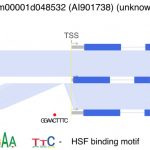Monika Chodasiewicz: Plant Physiology First Author

 Monika Chodasiewicz, first author of “2′,3′-cAMP treatment mimics stress molecular response in Arabidopsis thaliana”
Monika Chodasiewicz, first author of “2′,3′-cAMP treatment mimics stress molecular response in Arabidopsis thaliana”
Current Position: Assistant Professor at Center for Desert Agriculture, KAUST Saudi Arabia
Education: PhD in Plant Science at Max Planck Institute for Molecular Plant Physiology, Potsdam, Germany
MSc in Biotechnology at University of Szczecin, Poland
BSs in Biotechnology at University of Szczecin, Poland
Non-scientific interest: sport – gym, running, team sport, traveling – active and leisure, dancing.
Brief-Bio: Already in High School I knew there are two things I really like the most. I love sport, and since I was very young I started to play handball which became my mayor passion. Second thing I was always in favor of was science. I was always curious about biology, biotechnology and working in the lab. Since I quit my professional handball carrier I dedicate myself to science. At the time I visited Max Planck Institute in Germany I realized I want to do PhD and continue in Academia. Likely I got that opportunity at the group of Prof. Joost van Dongen. During my PhD I worked on discovery of oxygen sensing mechanism in plants and I was involved in many collaborations around the world. For my Postdoc I stayed at Max Planck Institute but driven by curiosity I changed the direction of my research a bit. At the department of Prof. Lothar Willmitzer and under supervision of Dr. Aleksandra Skirycz I was working on developing tools to study small molecule-protein interactions. And that was the moment I found the direction of my research that I’m dedicating myself to peruse as independent researcher. Last year, I started my own group working on Stress Granules in Plants at Center for Desert Agriculture at King Abdullah University for Science and Technology (KAUST) in Saudi Arabia. The major interest of the Stress Granule group is to study mechanism of Stress Granule formation, their involvement in stress signaling and adaptation. Second direction of the group is to develop tools which will allow us to study those transient interactions with high precision.



